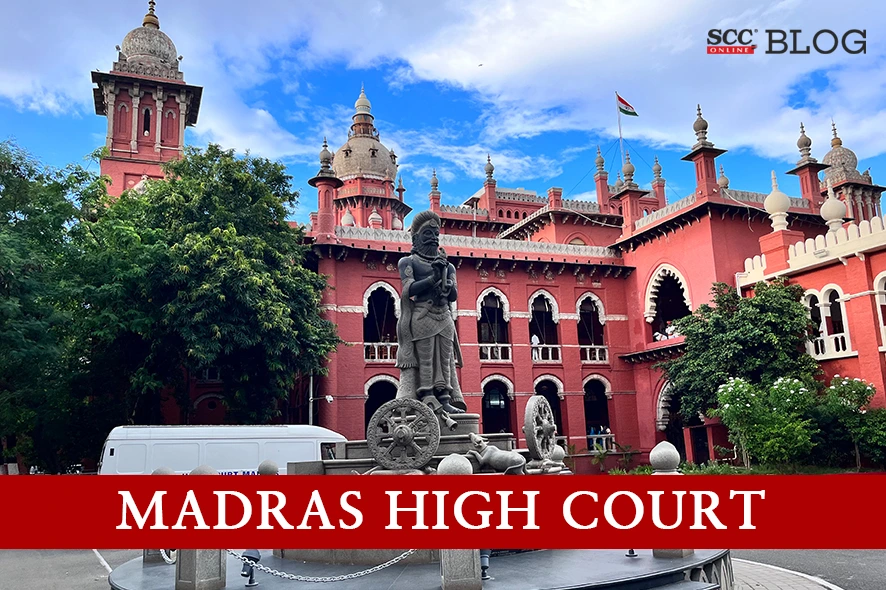Madras High Court: In a writ petition filed seeking issuance of a writ of declaration declaring Regulation 9(4) of the Postgraduate Medical Education Regulations, 2000 (‘Regulations, 2000’) as illegitimate, illegal and ultra vires the National Medical Commission Act, 2019 and the Constitution of India insofar as it permits State Governments to provide incentives to in-service candidates participating in the Open Category of Post Graduate Medical Admission Counselling, the division bench of Sanjay V. Gangapurwala, C.J. and P.D. Audikesavalu, J. has held that the policy of providing incentive marks to the in-service candidates and adding the incentive marks for competing with the open category candidates is not barred by any statute, Rules or Regulations. Thus, the Regulation 9(4) of the Post Graduate Medical Education Regulations, 2000 and Government Order dated 07-11-2020 do not suffer from arbitrariness.
The petitioners were seeking admission to the Post-Graduate Medical Courses. They challenged that (i) Reserving 50% seats for in-service candidates from the State quota does not satisfy the test of proportionality; and (ii)The weightage marks given to in-service candidates cannot be applied for admission from the open category, other than seats reserved for in-service candidates.
Issue:
Whether reserving and/or earmarking 50% of the State quota seats for in-service candidates is disproportionate and does not conform to the theory of proportionality?
Analysis:
The Court took note of Regulation 9(4) of the Regulations, 2000, and said that the reservation and/or separate channel of entry for in-service candidates in Postgraduate Degree courses is prevalent in various States. The extent of seats earmarked for in-service candidates differ from State to State. Since the year 1989, the State of Tamil Nadu had a policy of providing separate source of entry for in-service candidates to the extent of 50%.
Further, the Court noted that the policy of the State Government regulating admission to the postgraduate medical courses by Stipulation 29(c) of the Admission Prospectus for the academic year 2021-2022 was challenged, wherein the petition was dismissed.
The Court took note of K. Duraisamy v. State of T.N., (2001) 2 SCC 538, and said that these judgments upheld the policy of the State Government in creating a separate channel of admission for in-service candidates as there is a legitimate and rational basis in providing a separate channel/source of entry for in-service candidates in order to encourage them to offer their services and expertise to the State.
The Court said that Regulation 9(4), and the Proviso to Regulation 9(4) of the Regulations, 2000, as amended in the year 2018, has omitted the word “academic merit” that was prevalent in the Regulation 9 of the MCI Postgraduate Medical Education Regulations, 2000 after the judgments in State of M.P. v. Gopal D. Tirthani, (2003) 7 SCC 83 and Satyabrata Sahoo v. State of Orissa, (2012) 8 SCC 203
The Court said that the proviso to Regulation 9(4) of the Regulations, 2000 specifically provides that in determining the merit of candidates who are in service of government/public authority, weightage in the marks may be given by the government/competent authority as an incentive up to 10% of the marks obtained for each year of service in remote and/or difficult areas or rural areas up to maximum of 30% of the marks obtained in National Eligibility-cum Entrance Test.
After reading Regulation 9 of the MCI Regulations, 2000 and Regulation 9(4) of the Regulations, 2000 as amended in 2018 in juxtaposition, the Court noted that the phrase “academic merit” has been done away with and the requirement is only “merit”. Thus, it said that this deviation in the amended Regulation 9(4) and its Proviso is required to be considered. Proviso to Regulation 9(4) of the Regulations, 2000 makes it abundantly clear that in determining the merit of candidates who are in service, weightage in the marks may be given by the government/ competent authority as incentive. Those weightage marks as incentive become an integral part of merit. The incentive marks cannot be disassociated while competing from the open category.
The Court said that 50% of the seats are surrendered for All-India Quota. In this 50% All India Quota seats; no seats are earmarked for the in-service candidates. 50% of seats are earmarked only in the 50% seats reserved for the State Quota. The in-service candidates are to be encouraged to offer their services and expertise to the State. Effective and competent medical treatment is required to be made available in rural, hilly and remote areas. In-service Doctors, who pursue higher studies, would naturally have to serve in Government Hospitals till superannuation. Another object of giving incentive marks is to bring them on par with the nonservice candidates and candidates working in urban areas. These in-service Doctors, serving in rural, remote and hilly region do not have appropriate facilities and time. They gain practical experience and that also can form part of merit.
The Court said that candidates who have rendered service in urban areas are not given any weightage marks. They are kept on par with other open category candidates. The weightage marks are only accorded to those who have worked in such rural, remote and hilly areas. The intent and object is clear, i.e., to bring them on par with the candidates who were not in service.
[Dr. Gurubaran v. Union of India, 2023 SCC OnLine Mad 5399, Order dated 14-08-2023]
Advocates who appeared in this case :
For the Petitioners: Advocate Suhrith Parthasarathy;
For the Respondents: Advocate General .R. Shunmugasundaram, State Government Pleader P. Muthukumar, Additional Advocate General J. Ravindran, Advocate M. Sneha, Senior Panel Counsel P.G. Santhosh Kumar, Advocate Subharanjani Anandh, Senior Counsel P. Wilson, Advocate E. Manoharan.







